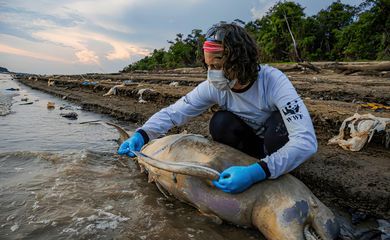Leptospirosis bacteria found in dolphins, sea lions

Two studies by scientists from different Brazilian research centers have found for the first time the bacterium Leptospira sp. in dolphins and sea lions off the coast of the country. The microorganism is the pathogen that causes leptospirosis, a disease that has killed more than 2,800 people in Brazil in the last ten years.

The scientists analyzed the DNA from the kidneys of dead marine mammals. In the study of 142 dolphins, the scientists found the bacteria in 21 individuals from five species: Stenella clymene, Sotalia guianensis, Pontoporia blainvillei, Steno bredanensis, and Tursiops truncatus.
The prevalence of the bacteria in coastal species (25 percent, or 17 out of 68 individuals studied) was found to be higher than in oceanic species (7.5 percent, or four out of 53 individuals).
The species with the most positive cases for the bacterium was the Guiana dolphin (Sotalia guianensis), found at various points along the Caribbean and Brazilian coasts, such as Rio’s Guanabara Bay. The pathogen was identified in ten of the 21 individuals surveyed (47.6%).
Among La Plata dolphins (Pontoporia blainvillei), found between Argentina and southeastern Brazil, the prevalence reached 33.4 percent—seven of the 21 animals studied.
This was the first time that the bacteria had been detected in these two coastal species and also in the Clymene dolphin (Stenella clymene), an oceanic species.
The source of the contamination is unknown and requires further studies to be confirmed, but it is believed that the animals are infected by effluents contaminated with rat urine in coastal areas close to large cities, port areas, and places with poor basic sanitation.
Sea lions
Of the 47 Arctocephalus australis and A. tropicalis species, Leptospira sp. was found in 15 individuals. It was more commonly found in individuals inhabiting areas with a larger human population.
The authors believe that further studies are needed to understand the impact that Leptospira sp. has on the bodies of Brazilian marine animals. In the US, where the relationship between the pathogen and sea lions has been studied for over 50 years, it has been found that leptospirosis can cause acute inflammation of the animals’ kidneys, leading them to strand in pain, dehydration, and emaciation, possibly causing death.
“No evidence of kidney damage has yet been found in the animals studied [in Brazil], so further evaluation of other parameters is needed in order to confirm whether clinical manifestations of the disease are found in marine animals in Brazil,” Felipe Torres, a researcher at the Fluminense Federal University (UFF), stated.


